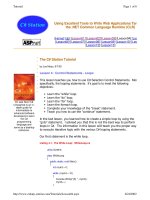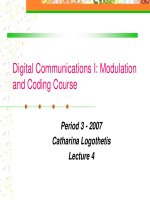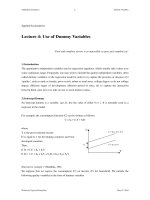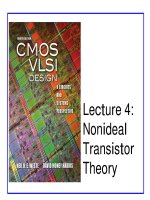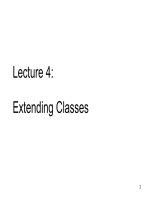Lecture 4 selection statements
Bạn đang xem bản rút gọn của tài liệu. Xem và tải ngay bản đầy đủ của tài liệu tại đây (1.32 MB, 32 trang )
Ho Chi Minh City University of Technology
Faculty of Computer Science and Engineering
Chapter 4: Selection Statements
Introduction to Computer Programming
(C language)
TS. Võ Thị Ngọc Châu
(,
)
2017 – 2018, Semester 2
Course Content
C.1. Introduction to Computers and
Programming
C.2. C Program Structure and its
Components
C.3. Variables and Basic Data Types
C.4. Selection Statements
C.5. Repetition Statements
C.6. Functions
C.7. Arrays
C.8. Pointers
C.9. File Processing
2
References
[1] “C: How to Program”, 7th Ed. – Paul
Deitel and Harvey Deitel, Prentice Hall, 2012.
[2] “The C Programming Language”, 2nd Ed.
– Brian W. Kernighan and Dennis M. Ritchie,
Prentice Hall, 1988
and others, especially those on the Internet
3
Content
Introduction
if..
statements
if..else..
Nested
statements
if../if..else.. statements
switch..case..
statements
Summary
4
Introduction
Recall
Statement
ended with a semicolon (;)
stretched on multiple lines with a backslash \ at the end
able to be grouped in the brackets {}
not consider spaces
Block
specified by {} with no semicolon after the right brace
contains as many statements as required
is a compound statement, syntactically equivalent to a
single statement
Sequentially
processed from the beginning to the
end of a function
5
Introduction
Given a
void main() {
set of n
double positiveNumber[10] = {2, 1, 3, 10, 8, 3, 4, 5, 9, 12};
positive
double minNumber = positiveNumber[0];
numbers,
int iteration = 1;
int n = 10;
while (iteration < n) {
find the
if (minNumber <= positiveNumber[iteration])
iteration = iteration + 1;
smallest
Single
statement
else {
one.
minNumber = positiveNumber[iteration];
iteration = iteration + 1;
(Chapter 1 –
Block
}
}
Real code in C)
}
6
Introduction
Control statements in C
Sequence
Selection
Assignment
Function calling
…
if
if..else..
switch..case..
Repetition
for..
while..
do..while..
7
Introduction
Given a
void main() {
set of n
double positiveNumber[10] = {2, 1, 3, 10, 8, 3, 4, 5, 9, 12};
positive
double minNumber = positiveNumber[0];
numbers,
int iteration = 1;
int n = 10;
while (iteration < n) {
find the
if (minNumber <= positiveNumber[iteration])
iteration = iteration + 1;
smallest
else {
one.
minNumber = positiveNumber[iteration];
iteration = iteration + 1;
(Chapter 1 –
}
Control Statements for Selection
}
Real code in C)
}
8
if.. statements
if (<Condition>) <Statement>
<Condition>
if (<Condition> )
{
<Statements>
}
false (0)
true ( 0)
<Statements>
<Statements> is performed (selected)
if <Condition> is true.
Otherwise, ignored.
9
if.. statements
grade>=5.0
false (0)
true ( 0)
printf(“Passed”);
Print “Passed” if grade >= 5.0.
Otherwise, ignored.
10
if..else.. statements
if (<Condition>) <Statement T>
else <Statement F>
if (<Condition>) <Statement T>
else
{
<Statements F>
}
if (<Condition> )
{
<Statements T>
}
else <Statement F>
if (<Condition> )
{
<Statements T>
}
else
{
<Statements F>
}
<Condition>
false (0)
true ( 0)
<Statements T>
<Statements F>
<Statements T> is performed (selected)
if <Condition> is true.
Otherwise, <Statements F> is performed.11
if..else.. statements
grade >= 5.0
false (0)
true ( 0)
printf(“Passed”);
printf(“Failed”);
Print “Passed” if grade >= 5.0.
Otherwise, print “Failed”.
12
if..else.. statements
Conditional expression:
<condition>?<expression T>:<expression F>
can be regarded as:
if (<condition>) <expression T>;
else <expression F>;
13
if..else.. statements
Which one do you prefer:
conditional expressions or
if..else.. statements?
14
Nested if../if..else.. statements
if (<condition 1>)
if (<condition 1>)
{
{
}
…
…
if (<condition 2>) …
if (<condition 2>) …
…
…
}
else
{
…
if (<condition 3>) …
…
}
15
Nested if../if..else.. statements
16
Nested if../if..else.. statements
17
Nested if../if..else.. statements
A multi-way decision
if (<condition 1>) <statements T1>
else if (<condition 2>) <statements T2>
else if (<condition 3>) <statements T3>
…
else if (<condition k>) <statements Tk>
else <statements Fk>
18
Nested if../if..else.. statements
Be careful with specifying “else” for “which if”:
if (<condition 1>)
if (<condition 2>) <statements T2>
else <statements F>
should be:
if (<condition 1>) {
d = ? 5? 10? 20?
if (<condition 2>) <statements T2>
}
else <statements F1>
or:
if (<condition 1>) {
if (<condition 2>) <statements T2>
else <statements F2>
}
d = ? 5? 10? 20?
19
switch..case.. statements
<case 1>
false (0)
<case 2>
<case N>
true (0)
true (0)
<Statements 1>
false (0)
<Statements 2>
true (0)
<Statements N>
switch (<expression>) {
case <case 1>: <Statements 1>; break;
case <case 2>: <Statements 2>; break;
…
case <case N>: <Statements N>; break;
[default: <Default>]
}
false (0)
<Default>
a multi-way decision
that tests whether an
expression matches one
of a number of constant
integer values, and
branches accordingly
20
switch..case.. statements
switch (<expression>) {
case <case 1>: <Statements 1>; break;
case <case 2>: <Statements 2>; break;
…
case <case N>: <Statements N>; break;
[default: <Default>]
}
can be regarded as:
if (<expression> == <case 1>) <Statements 1>
else if (<expression> == <case 2>) <Statements 2>
…
else if (<expression> == <case N>) <Statements N>
[else <Default>]
21
switch..case.. statements
<expression> has a type of integer numbers,
enumerated data, characters.
<case 1>, …, <case N> are constants of one
of the aforementioned types.
Cases serve as labels.
[default: <Default>] is optional.
“fall-through” property of switch..case..
After the code for one case is done, execution falls
through to the next unless an explicit action is
taken to escape.
break (return) statement
22
switch..case.. statements
aChar==„a‟
false (0)
true (0)
printf „a‟;
break;
aChar==„b‟
false (0)
…
true (0)
printf „b‟;
break;
false (0)
true (0)
…
printf
default;
23
switch..case.. statements
<case 1>
false (0)
<case 2>
false (0)
true (0)
true (0)
<Statements 1>
<Statements 2>
<case N>
false (0)
true (0)
<Statements N>
<Default>
switch..case.. statement with “fall-through” property
switch (<expression>) {
case <case 1>: <Statements 1>
case <case 2>: <Statements 2>
…
case <case N>: <Statements N>
[default: <Default>]
}
24
switch..case.. statements
switch..case.. statement with “fall-through” property
can be regarded as:
if (<expression> == <case 1>) {
switch (<expression>) {
<Statements 1>
case <case 1>: <Statements 1>
<Statements 2>
…
case <case 2>: <Statements 2>
<Default>
…
case <case N>: <Statements N> }
else if (<expression> == <case 2>) {
[default: <Default>]
<Statements 2>
}
…
<Default>
}
…
else if (<expression> == <case N>) {
<Statements N>
<Default>
}
25
[else <Default>]



